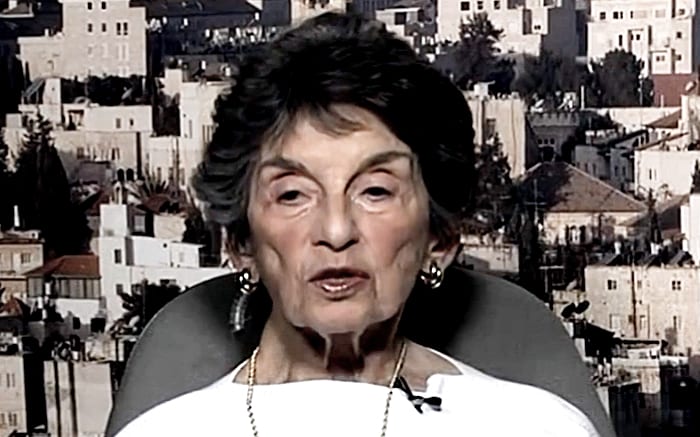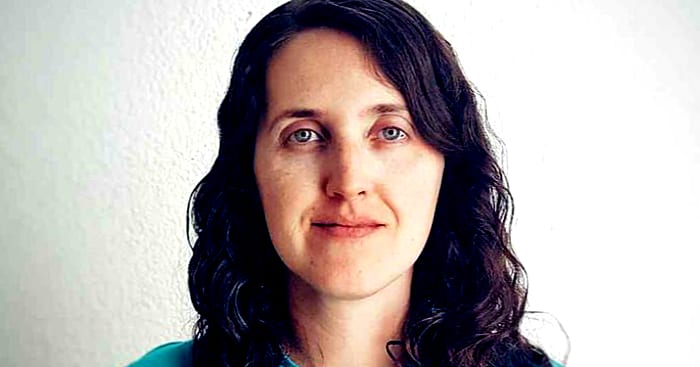
IN 2017 The Israel Religion Action Center (IRAC) brought a case against El Al on behalf Renee Rabinowitz, above, who was asked by the airline’s cabin crew to move after a strictly Orthodox Jewish male passenger refused to be seated next to her on one of the company’s flights.
They won, and El Al was ordered to pay the then 82-year-old Holocaust survivor, lawyer and psychologist compensation totaling 6,500 shekels (about $1,800).
The trial judge also ruled that El Al’s practice of requiring passengers to accommodate Haredi religious”values” violated the country’s Prohibition of Discrimination in Products law.
It’s now being reported that IRAC has notched up another victory in a similar case involving easyJet and a 38-years-old woman – referred to in this report as a “girl” – who has been awarded £15,000.

Melanie Wolfson, above, supported by IRAC, claimed the amount after she was made to change seats TWICE as a result of two ultra-Orthodox Jewish males’ refusal to sit next to her on a separate flights.
Wolfson additionally requested the easyJet to ban its cabin crew from asking “girls” to change seats due to their gender.
Faith-based misogny kicked in when an ultra-Orthodox man and his son, objected to her sitting in the row they occupied last October. Wolfson said she was ‘insulted and humiliated’ by the request.
She then lodged an official complaint with easyJet, arguing thee requests for her transfer seats was tantamount to gender discrimination.
Two months later, on other easyJet flight to London, Wolfson was asked again by two ultra-Orthodox males to find another seat.
When the company failed to take action, she and IRAC sued it for violating an of Israeli regulation that prohibits discrimination in regards to race, faith, nationality, land of origin, gender, sexual orientation and political opinions.
Though easyJet is just not primarily based in Israel, legal professionals argued the airline subject to Israeli regulations.
On Wednesday this week, IRAC posted the following statement from easyJet on its Facebook page:
easyJet is aware of the issue where some male passengers say they are uncomfortable sitting next to women, who are not in their immediate family, due to their religious beliefs and as a result request that a crew member ask female passengers to move seats.
easyJet does not believe that female passengers should be asked to move seats simply based on their gender. The airline has a policy to politely inform any customer who raises this request that this will not be accommodated. Unfortunately, according to Melanie Wolfson this policy was not followed in her case.
easyJet is committed to tackling any discrimination on flights. Therefore, we listened when Ms Wolfson told us about incidents of gender discrimination on our flights when she was asked to move simply because she is female. We take this very seriously and in addition to compensating Ms Wolfson for her experience, easyJet intends to implement additional crew training and renew our crew guidelines in order to prevent these incidents from happening in the future.
At easyJet we believe that flying should be a safe and enjoyable experience for everyone, regardless of their gender and we are committed to making sure this is the case going forward.
One battle lost by IRAC took place in 2018 when Israeli authorities turned down the group’s planned billboard campaign at Ben Gurion airport in Tel Aviv during the Jewish holiday Passover. The campaign was sparked by the Rabinowitz case. Convinced that the case had not halted these sorts of incidents, IRAC claimed female passengers were still being discriminated against since the ruling.
It wanted to display adverts that read: “Ladies, please take your seat … and keep it!”
The adverts reminded cabin crews that “requiring a passenger to switch seats because of their gender is illegal” and advised passengers that:
A flight attendant may not force you to switch seats to avoid mixed seating.

IRAC also produced a video urging women to refuse to give up their seats.

 I’d love a cup of coffee
I’d love a cup of coffee








